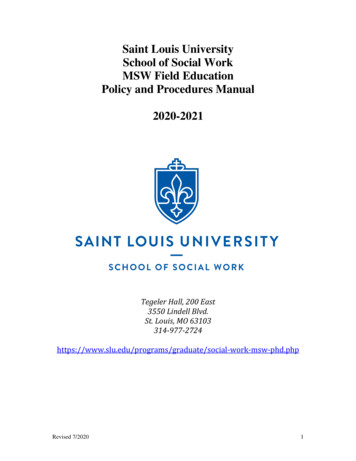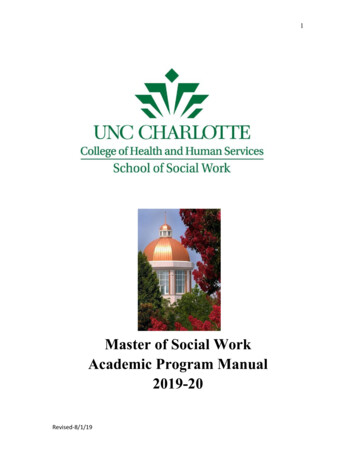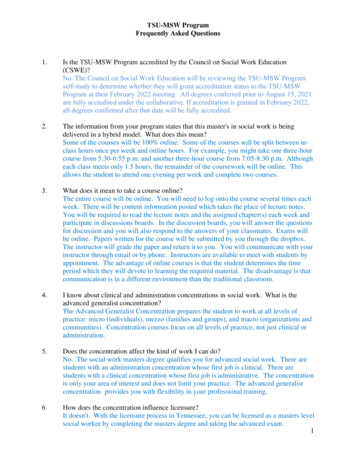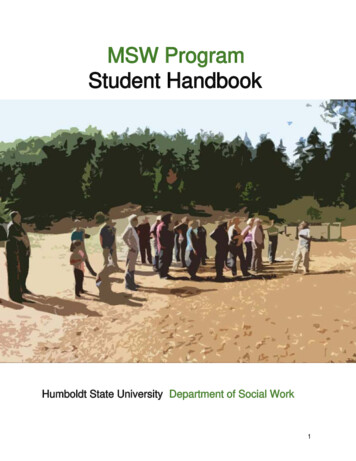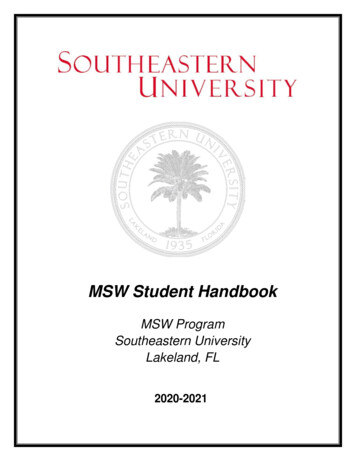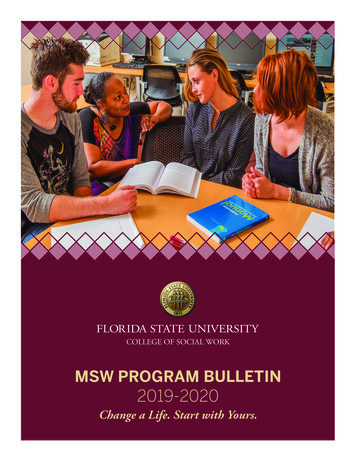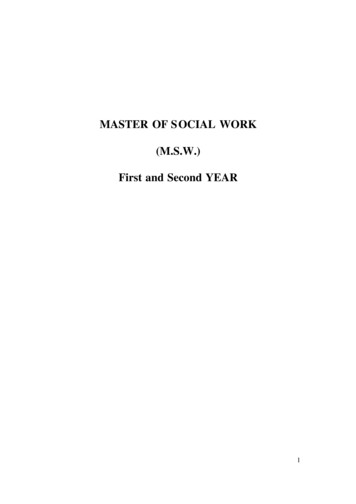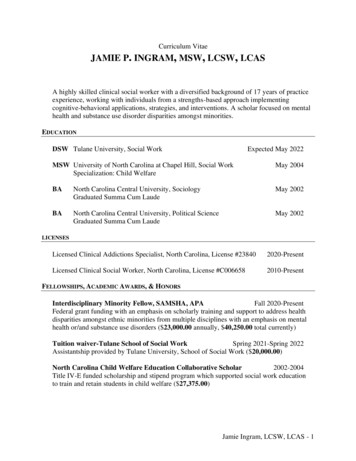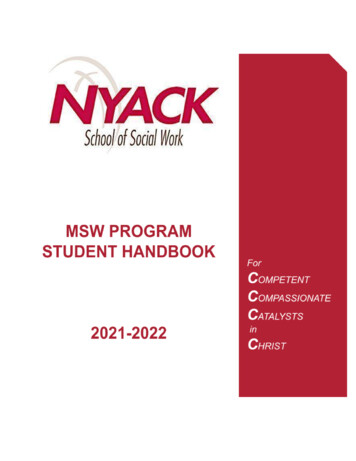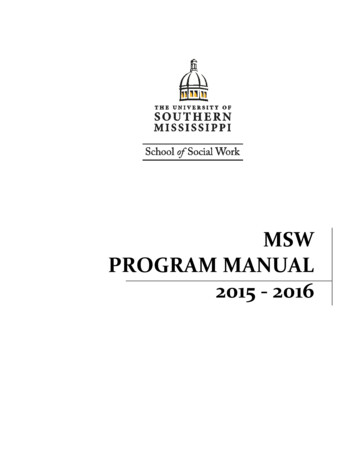
Transcription
MSWPROGRAM MANUAL2015 - 2016
THE UNIVERSITY OF SOUTHERN MISSISSIPPISCHOOL OF SOCIAL WORK118 College Drive #5114Hattiesburg, Mississippi 39406Telephone: (601) 266-4163FAX: (601) 266-4167AdministrationMichael Forster, Dean, College of HealthTim Rehner, Director, School of Social WorkSchool of Social Work Web Address:http://www.usm.edu/social-workThis manual is for information purposes only and is not an official publication of TheUniversity of Southern Mississippi. For official rules and regulations, please refer tothe bulletins which can be obtained from the Registrar, http://www.usm.edu/registrar.ii5/2015MSW Handbook,
PURPOSE OF THIS MANUALThe purpose of this manual is to describe the structures, goals and expectations, theroles and responsibilities, and the policies and procedures that form the basis for, andguide the MSW Program. It was prepared by faculty and students for YOU. Thehandbook contains information about the MSW Program, the curriculum, admission toand progression through the program and students’ rights and responsibilities. Pleaserefer to it whenever you have questions about the program.MSW Handbook, 5/2015iii
TABLE OF CONTENTSHistory . 1Mission . 1College of HealthSchool of Social WorkGoals and objectivesAccreditation Statement . 2Administrative structure of the School . 2Students Rights and Privileges. 3Nondiscrimination policyAmericans with Disabilities ActSafeguarding of Records (FERPA)Sexual HarassmentSocial Issues and Policies . 4Substance AbuseSmokingAdvisement . 4Curriculum Design. 5Foundation and ConcentrationEmphasis AreasAdministration and EmpowermentInterpersonal PracticeElectivesNo Credit for Life ExperienceCurriculum Requirements . 8Credit Hour Requirement for the MSW DegreeFull-Time Curriculum ModelPart-Time Curriculum ModelAdvanced Standing Curriculum ModelCourse Descriptions . 11Admissions . 16Admissions StandardsApplication DeadlinesConditional AdmissionQualifying Examiv5/2015MSW Handbook,
Non-Degree Seeking Graduate StudentsTransfer of CreditsTk20Academic Regulations and Policies . 20Progression PoliciesCourse WithdrawalIncomplete GradesNon-Duplication of Content Mastered in BSW programsTape/Digital RecordingAuditing a CourseGrade Appeal ProcessAcademic DishonestyElectronic DevicesChildren in the ClassroomGuests in the ClassroomCriminal Background CheckClass AttendanceScholarly MisconductPolicy Exemption RequestsDealing with Problems . 24Relevant to Classroom InstructionRelevant to Field EducationConcerns not related to Field Education or Classroom InstructionGrade AppealUniversity Grievance policyTermination Policy . 25Policy for Terminating Enrollment in the Social Work ProgramExpected Ethical BehaviorBehavior that May Constitute TerminationCriteria for Termination for Academic PerformanceStudent Performance CommitteeCommunication . 28TextingBulletin BoardsFacebookInternet AccessLetters of ReferenceChange of Address/Phone NumbersEmailStudent Recognition. 29AwardsBanquetHonorsGraduation . 29MSW Handbook, 5/2015v
When to Apply/Application for DegreeHooding CeremonyProfessional Licensure . 29Mississippi BoardNational licensure ExamSpecialized Learning Opportunities . 30Caribbean Studies ProgramStudent Participation on School Committees . 30Composition of School CommitteesStudent Organizations and Professional Affiliations . 31National Association of Social Workers (NASW)SASW (Student Association of Social Workers)Phi Alpha Honor SocietyUniversity Services and Academic Support Programs . 32Student Support ServicesThe Writing/Speaking CenterOffice of Disability AccommodationsStudent Health ServicesCARES (Campus Action Referral and Evaluation System)Counseling CenterCareer and Student Employment ServicesLibrariesBookstoreFinancial Aid/Scholarships . 32Employment Opportunities. 32AppendicesA. Foundation and Concentration Competencies/Practice Behaviors . 33B. Social Work Professional and Technical Standards . 41C. Professional Expectations for Social Work Students . 44D. NASW Code of Ethics . 46vi5/2015MSW Handbook,
HISTORY OF THE GRADUATE SOCIAL WORK PROGRAMThe School of Social Work at The University of Southern Mississippi has a long history.Social work courses were included in the curriculum of the Department of Sociologyand Anthropology since 1960. At that time, students were allowed to major in sociologywith an emphasis in social work. There were three social work courses at that time:Introduction to Social Work, Methods of Social Work, and Field Work Practicum.During the late 1960’s there was growing national attention on the importance of socialwork licensure and social work education. There was also a growing awarenessnationwide that a social work emphasis in a sociology program was not adequate toaddress the complex problems individuals, communities and societies may need to haveaddressed. At this same time locally, there was a growing movement, spearheaded bythe National Association of Social Workers – Mississippi Chapter to establish anautonomous School of Social Work, separate from the academic disciplines ofsociology and anthropology. In 1973, the Board of Trustees of Institutions of HigherLearning in the State of Mississippi established the first graduate school of social workin the State of Mississippi, at The University of Southern Mississippi.The School of Social Work received initial accreditation from the Commission onAccreditation, Council on Social Work Education in 1976. In June, 1979, the School’saccreditation was reaffirmed after a mandatory review. The graduate social workprogram at The University of Southern Mississippi has been continuously accreditedsince that time. The School of Social Work now offers Full-Time, Part-Time, andAdvanced Standing graduate programs on the Hattiesburg and Gulf Coast campuses.VISION & MISSION OF THE COLLEGE OF HEALTHVisionAdvancing health and well-being through excellence and innovation in teaching,research, and service.MissionThe mission of the College of Health at The University of Southern Mississippi is tocreate, apply, and transmit expert knowledge, within and across the domains of its constituentdisciplines, for the well-being and betterment of individuals, community, state, nation, andworld.MISSION OF THE SCHOOL OF SOCIAL WORKThe USM School of Social Work develops and transmits social work knowledge and skillsconsistent with the values of the profession, informed by the culture and history of Mississippi.We are inspired by a vision of social justice and advocacy for the health and well-being of allpeople. Our graduates engage clients who primarily reside in the increasingly diverse Gulf Southto produce dynamic solutions for personal, interpersonal, and system problems-especially thoseunique to the poor, oppressed, and underserved.MSW Handbook, 5/20151
GOALS AND OBJECTIVES OF THE SCHOOL OF SOCIAL WORKWe prepare students for competent, ethical, and culturally informed social work practice.We deliver a dynamic, integrated competency-based curriculum.We infuse opportunities across the curriculum for students to demonstratemastery of social work knowledge, skills, and values.We promote a professional social work identity.We advance knowledge relevant to social work practice and social welfare.We engage faculty, staff, and students in research and scholarship.We pursue and secure external funding to support research and programactivities.We translate research findings and critical inquiry into scholarly products thatinform practice, policy, and social service delivery.We inspire realization of human potential.We promote healthy human growth and development.We develop dynamic strategies and actions to address oppressive socialconditions.We model leadership and advocacy for social change.ACCREDITATION STATEMENTThe Council on Social Work Education (CSWE), a national professional social workeducation standard setting body, sets guidelines and policies which all accredited BSW andMSW programs must follow in order to attain their status as accredited institutions. The Masterof Social Work program has been continuously accredited by/CSWE since 1976. The BSWprogram has been continuously accredited by CSWE since 1996. Students are also encouragedto review the Educational Policy and Accreditation Standards for social work degree programsas set forth by the CSWE. The full text of the CSWE Policies is available athttp://www.cswe.org.ADMINISTRATIVE STRUCTURE OF THE SCHOOLThe School of Social Work is an autonomous unit within the College of Health. It isadministered by the Director, who has delegated authority for certain educational andadministrative tasks to individuals and committees within the School.The administrative team of the School consists of the Director, a MSW ProgramCoordinator, a BSW Program Coordinator, the Director of Field Instruction and several staff.25/2015MSW Handbook,
The MSW and BSW Coordinators share in the overall management of the School, withemphasis on the MSW and BSW programs.The Coordinator of Field Instruction oversees the operation of field programs byimplementing and enforcing field policies. See the field handbook for current field policies andprocedures.STUDENTS RIGHTS AND PRIVILEGESNondiscrimination PolicyThe University of Southern Mississippi offers to all persons equal access to educational,programmatic and employment opportunities without regard to age, sex, sexual orientation,religion, race, color, national origin, Vietnam era veteran status or disability status. Seewww.usm.edu/aa-eeo/aaeeo-policies for the University’s AA/EEO policies including sexualharassment.The School of Social Work program's organization and implementation is conductedwithout discrimination on the basis of race, color, gender, age, creed, ethnic or national origin,disabilities, political beliefs or sexual orientation. The program faculty is committed to teach,encourage and promote an appreciation for and understanding of diversity in the School,College, University, community, and profession. The School seeks diversity among its faculty,staff, and students.ADA PolicyIf a student has a disability that qualifies under the American with Disabilities Act(ADA) and requires accommodations, he/she should contact the Office for DisabilityAccommodations (ODA) for information on appropriate policies and procedures. Disabilitiescovered by ADA may include learning, psychiatric, physical disabilities, or chronic healthdisorders. Students can contact ODA if they are not certain whether a medicalcondition/disability qualifies.Hattiesburg:The University of Southern MississippiOffice for Disability Accommodations118 College Drive # 8586Hattiesburg, MS 39406-0001Gulf Coast:The University of Southern Mississippi on the Gulf CoastOffice for Disability Accommodations730 East Beach BlvdLong Beach, MS 39560Voice Telephone: (601) 266-5024 or (228) 214-3232Fax: (601) 266-6035Individuals with hearing impairments can contact ODA using the Mississippi Relay Service at1-800-582-2233 (TTY) or email Suzy Hebert at Suzanne.Hebert@usm.edu.Safeguarding of RecordsUnder the Family Educational Rights and Privacy Act (FERPA) of 1974, universitystudents have the right to inspect and review and all records, files, and data directly related tothem. The University will not ordinarily release a student’s record to any outside agency withoutMSW Handbook, 5/20153
consent of the student. See liance-policyfor more information.Sexual HarassmentIt is the policy of the University that no member of its community shall sexually harassanother. Any employee or student who violates this policy is subject to disciplinary actionincluding termination. Sexual harassment is illegal under both state and federal law. For furtherinformation, go to the student survival guide athttp://www.usm.edu/pubs/studenthandbook/.Social Issues and PoliciesSubstance AbuseThe University prohibits the unlawful possession, use, or distribution of illicit drugs andalcohol by students and employees on University property or as a part of any of its activities.The University will impose disciplinary sanctions consistent with local, state, and federal lawson students and employees who violate this policy. For further information go the studentsurvival guide (student handbook).SmokingAll University buildings are smoke-free.ADVISEMENTAdvisement is an essential component of the MSW program at The University ofSouthern Mississippi. Beginning at the time of admission to the program, students receiveadvisement from the MSW Coordinator. Students are then advised during their first course,SWK 603 Professional Development I. Advisement is available by the MSW Coordinatorthroughout the entire program.The purpose of advisement is to provide counsel, guidance, and support to the studentin his or her efforts to achieve educational and professional goals. Advisement is not meant toreplace the student’s complete understanding of the requirements of the MSW program and/orGraduate School requirements. Students are expected to know and follow all Graduate Schoolrequirements as posted in the Graduate School Bulletin and Student Handbook.The MSW Coordinator will assist the student in the logical progression of academicwork that is based on a pre-determined academic plan of study. In the MSW program coursesare sequential, and one may not take a course unless a pre-requisite or a recommended courseis complete prior to enrollment. Students will be asked to withdraw from a course if it is not insequence or recommended by the MSW Coordinator. The MSW Coordinator will assist eachstudent in making progress towards degree completion in a timely manner. The MSWCoordinator will also assist each student in the Application for Degree.The MSW Coordinator will serve as a guide for each student’s development as aprofessional social worker. The MSW Coordinator will meet with students individually, in asmall group setting, or at a field placement site. The MSW Coordinator will discussopportunities for professional growth, connections to professional groups and organizations,45/2015MSW Handbook,
and answer questions students may have. All faculty are also available and may assist studentswith questions or concerns throughout the program. The MSW Coordinator may also assistwith personal or professional problems students may have that might impact their timelyprogression through the MSW program. The MSW Coordinator will not serve as a replacementfor professional mental health services. If the MSW Coordinator believes a student needsservices beyond those provided by the school, he or she may be referred for additional mentalhealth care services.CURRICULUM DESIGNIn November 2008, the School of Social Work began the process of reviewing theCouncil of Social Work Education’s newly revised and approved Educational Policy andAccreditation Standards (EPAS), which required our MSW program to move away from acontent-driven curriculum (e.g., courses designed to cover content related to policy, practice,research, theory) to a competency-based outcomes approach (e.g., courses leading to studentdevelopment and demonstration of specified outcomes). The overall goal was to ensure that ourgraduates were prepared to work competently with all systems (i.e., individuals, families,groups, organizations, and communities) in virtually any setting.The 2008 EPAS defines 10 competencies, which are considered common to all socialwork practice (EP 2.1.1—EP 2.1.10). Each of the 10 competencies consist of knowledge,values, and skills that define what social workers – and more specifically, our graduates -must know and be able to demonstrate in order to practice effectively. The schooloperationalized the 10 competencies through 41 specific practice behaviors. Thecurriculum of the foundation year in the MSW program is built around these 41 practicebehaviors. Refer to Appendix A for more information on the 10 competencies and 41foundation practice behaviors.The 2008 EPAS also reads that advanced practice incorporates all of the 10 corecompetencies augmented by knowledge and practice behaviors specific to aconcentration. (EP M2.2; CSWE 2008). The School operationalizes the curriculum ofthe advanced concentration through 23 practice behaviors. These advanced practice behaviorsin the concentration extend and build upon the 41 from the foundation year. Refer to AppendixA for more information on the 10 competencies and the 23 concentration advanced practicebehaviors.Relationship-Based Practice ConcentrationUpon a thorough review of the School’s Mission Statement, its goals and objectives,the context within which it operates in South Mississippi, and the creation of the foundationyear curriculum (operationalizing the 10 competencies through 41 practice behaviors), theSchool of Social Work selected a Relationship-Based Practice Concentration. The faculty agreethat all aspects of social work practice are essentially relationship-based. Most social workerswould likely agree change occurs in, with, and through a network of human relationships. Whilethe use of and need for relationships has always been present in all courses, relationship-basedpractice has only recently been adopted by the faculty as the School of Social Work’s AdvancedPractice Concentration. The faculty believed the 10 competencies and 41 foundation practicebehaviors would be best extended and elaborated in classroom instruction and field practicumthrough the explicit focus on the professional relationship. The 23 practice behaviors selectedMSW Handbook, 5/20155
by the faculty for the Relationship-Based Concentration are, collectively, intended to assist thestudents in further developing and integrating their knowledge and understanding of theinfluence of socio-economic, political and cultural contexts, their critical thinking and ethicaldecision making, their values and beliefs in worth, dignity, equality and human rights, and theirintra- and inter-personal practice skills.In the School of Social Work, a relationship-based model of social work practice drawsupon, but is not limited to, the influences of psychodynamic, developmental, ecologicalsystems, and attachment theories. As such, current thoughts, feelings, beliefs, and behaviorsare affected by both prior and current experiences and by the connections between intrapsychic,interpersonal and broader social contexts, of which we may or may not be fully or consciouslyaware. It recognizes that each system’s (individuals, families, groups, organizations, andcommunities) responses to the uniqueness of its varying circumstances are interconnected.Attention is therefore paid to the relationship-- the specific aspects, qualities, and factorssignificant to the relationship with self and others.EmphasisWithin the Relationship-Based Practice Concentration, all but 8 hours consist ofrequired courses. Students are encouraged to select one of two sets of courses totaling 8 hoursthat will result in the completion of requirements for an emphasis. As a whole, each emphasisarea builds on the competencies from the foundation year courses. Also, each specific emphasiscourse integrates and applies the foundation knowledge and skills in a more focused mannerallowing elaboration of the practice behaviors. The student’s professional self becomes moreengrained. In addition, students are placed in a field practicum (4 hours) that is related to theselected emphasis area. A minimum of twelve hours are therefore dedicated to each emphasisarea. The two emphasis areas are: Administration and Empowerment and Interpersonal Practice.Administration and Empowerment. This emphasis area prepares students to beleaders and catalysts for change at organizational and community levels, capable of buildingfunctional relationships that empower clients as well as other helping professionals to articulateproblems and develop effective solutions to those problems. Students will be able todemonstrate the knowledge and skills necessary to: 1) assess problems and solutions fromvarious perspectives; 2) collaborate with and advocate with/for diverse stakeholder groups todefine problems and develop cross-systems solutions at mezzo and macro levels; 3) design,implement, and evaluate culturally- and contextually-relevant, evidence-based programming;4) lead, administer, manage, and supervise helping professionals in nonprofit, private, andpublic settings; and 5) inform policy practice discussions and decisions.Students selecting this emphasis will be required to enroll in SWK 633 Social WorkLeadership Theory and Practice (2 hours), SWK 663 Consultation and Supervision (3 hours),and SWK 637 Administrative Research and Entrepreneurship (3 hours).Interpersonal Practice. This emphasis area prepares students to utilize professional,therapeutic relationships to restore, maintain, and enhance the bio-psycho-social functioning ofindividuals, families, and groups. Students will be able to demonstrate the knowledge and skillsnecessary to: 1) establish a working relationship with a client and attend to the influences ofboth internal and interpersonal dynamics in an environmental context; 2) conduct and complete65/2015MSW Handbook,
differential and multi-dimensional assessments and diagnoses; 3) critically appraise bestpractices and evidence-based interventions; 4) employ a range of interventions necessary toempower and advocate for clients addressing addictions, dysfunctions, disorders, anddisabilities; and 5) evaluate effectiveness of practice in order to inform future practice effortsand contribute to the profession’s knowledge base.Students selecting this emphasis will be required to enroll in SWK 657 Advanced SocialWork Practice and Addictions (2 hours), SWK 677 Advanced Practice with Children andAdolescents (3 hours), and SWK 667 Advanced Social Work Practice with Adults (3 hours).ElectivesEach semester, two or three social work elective courses are available. Elective coursescan be taken rather than courses that were designed for the two emphasis areas. Elective coursesmust be selected from those available and do not conflict with coursework required by thestudent’s curriculum model. Students who do not wish to pursue an emphasis must enroll in atleast 8 hours of any combination of available electives or emphasis courses. Elective coursesmay not be taken outside the School of Social Work.No Credit for Life ExperienceAcademic credit for life experience and previous work experience is not given in lieuof the field placement or any other required social work course.MSW Handbook, 5/20157
CURRICULUM REQUIREMENTSCurriculum ModelsThe School offers Full-Time, Part-Time, and Advanced Standing curriculum models.The Full-Time and Part-Time models are both 60 hours and only begin in the fall. The FullTime model is five continuous semesters, the Part-Time is eight continuous semesters, and theAdvanced Standing model is three continuous semesters. The Advanced Standing model is 34hours and only begins in the summer.Full-Time Curriculum ModelSemester OneSWK 600SWK 603SWK 607SWK 611SWK 614Semester TwoSWK 604SWK 615SWK 659SWK 651SWK 618SWK 619Semester ThreeSWK 629SWK 613Emphasis/ElectiveSemester FourSWK 616SWK 661SWK 643SWK 646Emphasis/ElectiveSemester FiveSWK 647SWK 662SWK 644SWK n Rights and Social JusticeProfessional SWK Development ISystems and the Human Life CourseProblem Solving with IndividualsSWK Integrative Seminar IProfessional SWK Development IISWK Integrative Seminar IISWK Full-Time Field Education ITime Limited Intervention: CrisisSocial Welfare Policy and ContextEvidence-Based Practice in SWK122333Problem Solving with FamiliesProblem Solving with GroupsSWK 657 Addictions OR SWK 633 Leadership332SWK Integrative Seminar IIISWK Full-Time Field Education II (Semester I)Advanced Social Work Practice IProgram and Community DevelopmentSWK 677 Advanced Practice with Children & AdolescentsOR SWK 663 Consultation and Supervision2233SWK Integrative Seminar IVSWK Full-Time Field Education II (Semester II)Advanced Social Work Practice IIMgmt., Supervision and Leadership in SWKSWK 667 Advanced Practice with Adults ORSWK 637 Administrative & Research Entrepreneurship223333MSW Handbook,
60Total Hours:Part-Time Curriculum ModelCredits313Semester OneSWK 600SWK 603SWK 607CoursesHuman Rights and Social JusticeProfessional SWK Development ISystems and the Human Life CourseSemester TwoSWK 611SWK 614Problem Solving with IndividualsSWK Integrative Seminar I32Semester ThreeSWK 618SWK 619Social Welfare Policy and ContextEvidence-Based Practice in SWK33Semester FourSWK 604SWK 615SWK 626SWK 629Professional SWK Development IISWK Integrative Seminar IISWK Part-Time Field Education IProblem Solving with Families1213Semester FiveSWK 613SWK 627SWK 651Problem Solving with GroupsSWK Part-Time Field Education IITime Limited Intervention: Crisis313Mgmt., Supervision and Leadership in SWKProgram and Community DevelopmentSWK 657 Addictions OR SWK 633 Leadership332SWK Integrative Seminar IIISWK Part-Time Field Education IIIAdvanced Social Work Practice ISWK 677 Advanced Practice with Children & AdolescentsOR SWK 663 Consultation and Supervision223SWK Part-Time Field Education IVAdvanced Social Work Practice IISWK Integrative Seminar IVSWK 667 Advanced Practice with Adults ORSWK 637 Administrative & Research Entrepreneurship232Semester SixSWK 645SWK 646Emphasis/ElectiveSemester SevenSWK 616SWK 641SWK 643Emphasis/ElectiveSemester EightSWK 642SWK 644SWK 647Emphasis/ElectiveMSW Handbook, 5/2015339
60Total Hours:Advanced Standing Curriculum ModelSemester OneSWK 629SWK 613Emphasis/ElectiveSemester TwoSWK 616SWK 661SWK 643SWK 646Emphasis/ElectiveSemester ThreeSWK 647SWK 662SWK 644SWK 645Emphasis/ElectiveTotal Hours:105/2015Credits332CoursesProblem Solving with FamiliesProblem Solving with GroupsSWK 657 Addictions OR SWK 633 LeadershipSWK Integrative Seminar IIISWK Full-Time Field Education II (Semester I)Advanced Social Work Practice IProgram and Community DevelopmentSWK 677 Advanced Practice with Children & AdolescentsOR SWK 663 Consultation and Supervision2233SWK Integrative Seminar IVSWK Full-Time Field Education II (Semester II)Advanced Social Work Practice IIMgmt., Supervision and Leadership in SWKSWK 667 Advanced Practice with Adults ORSWK 637 Administrative & Research Entrepreneurship22333334MSW Handbook,
MSW COURSES AND COURSE DESCRIPTIONS (2013)511Spirituality in3 hrs. This course addresses issues of spirituality and religionSocial Workin the practice of generalist social work.Practice (elective)521600Social Work:3 hrs. Explores the dynamics of complicated mourning.ComplicatedConcepts include theoretical framework, as well as specialMourning and Griefsituations. Assessment and intervention skills are(elective)highlighted.Human Rights &3 hrs. Comparative cross-cultural theories and conceptsSocial Justice in arelated to ethnic-minority groups and alternative life styles.Diverse Society603604Professional Social1 hr. Introduction to social work, with an emphasis onWork Developmentprofessional development, the concepts, critical thinking andIvarious forms of literacy will be explored.Professional Social1 hr. Co-requisite: SWK 659 or SWK 626. In-depthWork Developmentorientation and preparation to field education.II606607611Global Perspective3 hrs. Examines the effects of social welfare policy,in Human Rightsdiscrimination, and economic injustice and explores(elective)opportunities for advocacy and outgroup empo
MSW Handbook, 5/2015 3 The MSW and BSW Coordinators share in the overall management of the School, with emphasis on the MSW and BSW programs. The Coordinator of Field Instruction oversees the operation of field programs by implementing and enforcing field policies. See the field handbook for current field policies and procedures.
